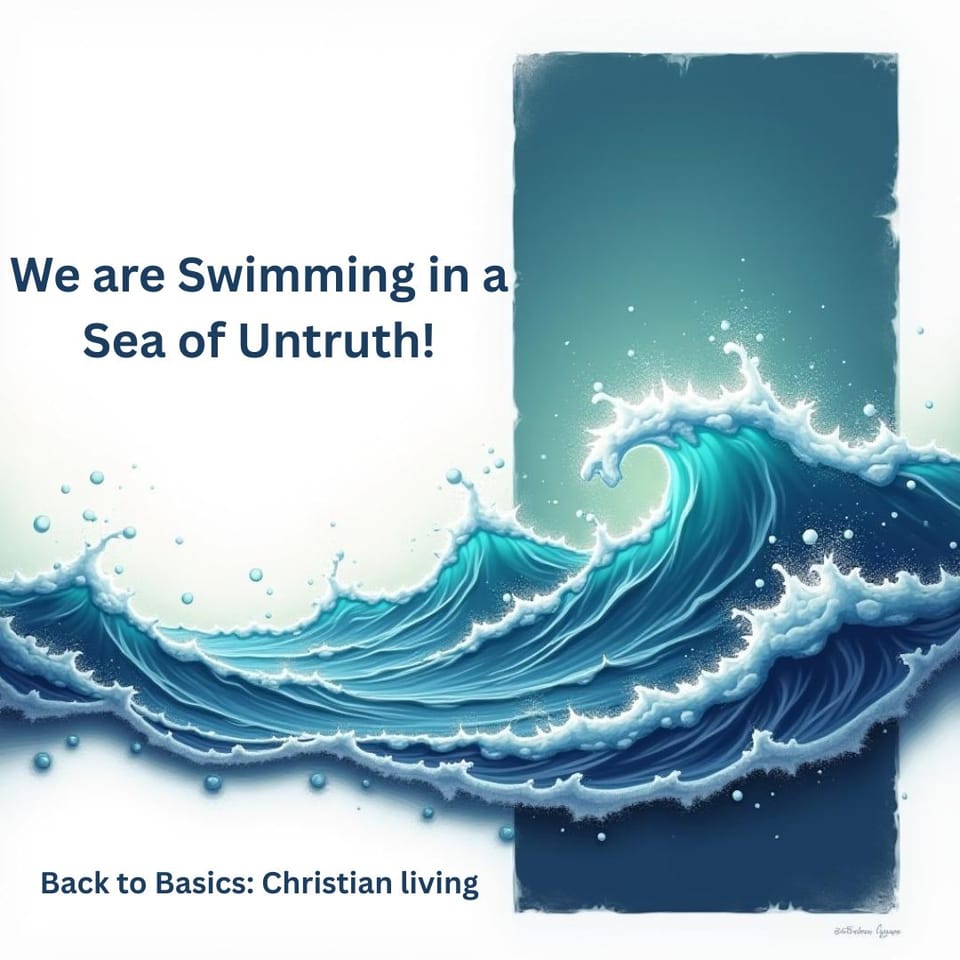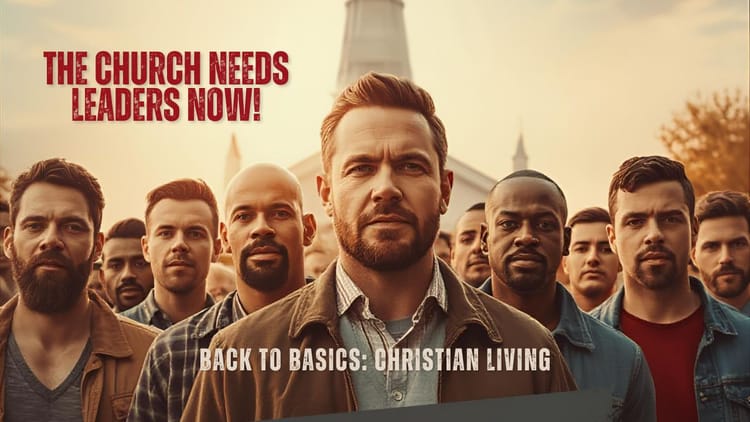We are Swimming in a Sea of Untruth!

Anchoring Faith in a Digital Age of Misinformation!
In our increasingly digital age, we find ourselves adrift in what can only be described as a vast sea of untruth. Every day, as we scroll through our devices, we're bombarded with countless contradictory claims, half-truths, and outright falsehoods, all packaged to appear credible and compelling. This deluge of deception isn't merely an inconvenience—it represents one of the most significant spiritual challenges of our time.
Scripture warned us this would happen. The Apostle Paul, writing to Timothy, foresaw a time when people would "turn away their ears from the truth, and shall be turned unto fables" (2 Timothy 4:4 KJV). These words, penned nearly two millennia ago, describe our present reality with startling accuracy. We've become a society that increasingly values emotional satisfaction over objective truth, preferring comfortable falsehoods to uncomfortable realities.
Consider how Isaiah lamented, "Truth is fallen in the street, and equity cannot enter" (Isaiah 59:14 KJV). This powerful metaphor depicts truth as something trampled underfoot while people hurry past, too preoccupied with their own pursuits to notice or care. In our time, truth doesn't merely lie fallen—it's actively buried beneath mountains of misinformation, conspiracy theories, and partisan narratives.
Jesus Himself cautioned His followers, "Take heed that no man deceive you" (Matthew 24:4 KJV). He understood that deception would be a persistent threat to His church throughout the ages. Today, this deception comes packaged in sleek, sophisticated forms—compelling videos, beautifully designed infographics, and persuasive arguments that contain just enough truth to make the lies palatable.
So how do we, as followers of Christ, maintain our footing in this treacherous landscape? How do we discern truth from falsehood when the lines between them are deliberately blurred?
Scripture offers us clear guidance:
First and foremost, we must anchor ourselves firmly in God's Word. The Psalmist declared, "Thy word is a lamp unto my feet, and a light unto my path" (Psalm 119:105 KJV). When everything around us seems uncertain, Scripture remains our unwavering standard. In a world of shifting opinions and evolving "truths," the Bible stands as our fixed point of reference.
This doesn't mean simply quoting verses out of context to support our preconceived notions. Rather, it means immersing ourselves in the full counsel of Scripture, understanding its historical context, literary forms, and overarching narrative. The Bereans provide our model here, as they "searched the scriptures daily, whether those things were so" (Acts 17:11 KJV). They didn't passively accept even apostolic teaching without verifying it against God's revealed truth.
Second, we need the guidance of the Holy Spirit, whom Jesus called "the Spirit of truth" who "will guide you into all truth" (John 16:13 KJV). Intellectual discernment alone isn't sufficient; we need spiritual discernment as well. This comes through prayer, through cultivating sensitivity to the Spirit's promptings, and through living in obedience to what we already know to be true.
The Spirit often works through that quiet, internal check we feel when something doesn't align with God's character or Word. As John advises, "Beloved, believe not every spirit, but try the spirits whether they are of God: because many false prophets are gone out into the world" (1 John 4:1 KJV). This spiritual testing is essential in our discernment process.
Third, we must develop robust critical thinking skills. Paul instructs us to "prove all things; hold fast that which is good" (1 Thessalonians 5:21 KJV). This involves questioning narratives, examining sources, considering biases (including our own), and not accepting claims merely because they align with what we already believe or want to hear.
We should ask: Who benefits from me believing this? What evidence supports this claim? Is this information presented in its proper context? Does this align with the full counsel of Scripture? Solomon reminds us that "The simple believeth every word: but the prudent man looketh well to his going" (Proverbs 14:15 KJV).
Fourth, we need the accountability of faithful Christian community. Proverbs tells us that "Iron sharpeneth iron; so, a man sharpeneth the countenance of his friend" (Proverbs 27:17 KJV). None of us is immune to deception, which is why we need brothers and sisters who will lovingly challenge our thinking when necessary.
This requires humility on our part—a willingness to admit we might be wrong and to reconsider our positions. As James counsels, "let every man be swift to hear, slow to speak, slow to wrath" (James 1:19 KJV). In contentious times, these qualities become increasingly rare and proportionally valuable.
The reality that we're swimming in a sea of untruth shouldn't paralyze us with fear or make us cynical. Instead, it should motivate us to develop greater spiritual vigilance. Jesus promised, "ye shall know the truth, and the truth shall make you free" (John 8:32 KJV). There's liberation in embracing truth, even when it's countercultural or uncomfortable.
When we feel overwhelmed by the sheer volume of falsehood around us, we can take comfort in this beautiful truth: we serve the God who is Truth itself. Jesus declared, "I am the way, the truth, and the life" (John 14:6 KJV). In Him, we find both our compass and our shore—our guidance through these deceptive waters and our ultimate destination of perfect truth.
So today, let us be intentional about seeking truth. Let us not passively consume whatever information comes our way, but rather test it, examine it, and hold it up to the light of Scripture. And let us remember that in a world where truth seems increasingly relative, we serve a God whose truth is absolute and unchanging. As the prophet Malachi reminds us, "For I am the LORD, I change not" (Malachi 3:6 KJV).
In this sea of untruth, may we be lighthouses—not just discerning truth for ourselves, but also guiding others toward the solid ground of God's unchanging Word and character. For ultimately, it is the truth that sets us free…
Key Takeaways:
- In today's digital age, we're surrounded by misinformation and falsehoods that challenge our spiritual discernment.
- Scripture warned of this era where people would "turn away their ears from the truth" (2 Timothy 4:4 KJV).
- To navigate this sea of untruth, we must anchor ourselves firmly in God's Word, seeking understanding through proper context and study.
- The guidance of the Holy Spirit—"the Spirit of truth"—is essential for spiritual discernment beyond intellectual analysis.
- Developing critical thinking skills helps us examine sources, question narratives, and consider biases before accepting information.
- Faithful Christian community provides accountability and different perspectives that sharpen our discernment.
- As believers, we're called not just to discern truth for ourselves but to be "lighthouses" guiding others toward God's unchanging Word.





